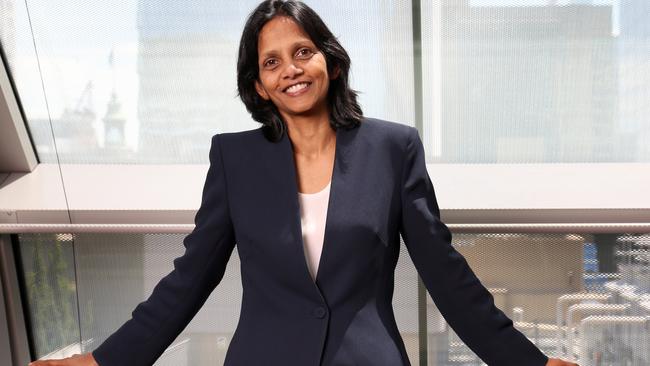Macquarie CEO Shemara Wikramanayake says infrastructure key to national prosperity
Increased investment will be required to ensure our cities keep pace with a growing population, Macquarie’s chief says.

In the 2018 edition of his CEO survey, John Durie asked more than 60 of the biggest names in business five key questions about what’s coming in 2019. Here’s what Macquarie CEO Shemara Wikramanayake had to say about the coming year.
-
What should be the key issues in the next federal election campaign?
There are some important issues that government is working through now. One theme is population growth, which is a key driver of economic activity in Australia and is closely correlated with robust government support of infrastructure spending in coming years.
Under all of the scenarios the Bureau of Statistics outlined in its population report released last month, Australia’s population will increase substantially. So infrastructure, and particularly resilient urban infrastructure, is going to be key to national prosperity during the medium and the long term.
We see our role at Macquarie to work hard to ensure we can match the significant pool of domestic and global savings looking to invest in Australia with the right infrastructure opportunities.
Another issue which is firmly on the political agenda is policy certainty. Australia is in a position where international investors remain favourably disposed to our rule of law and stable democracy despite what is seen as an historically unusual number of leadership changes over recent years.
So be it a renewable project in Western Australia or a new school in the ACT, a reliable regulatory framework gives institutional investors the confidence to commit capital over the long term.
Lastly, and arguably the most important area for this country is Australia’s engagement with the global economy. Australia is a small, open economy which has benefited enormously from our relationships with both the Asian region and broader global economy. For our future prosperity it is important that we continue to support a global trading system which is both rules-based and open.
What use are you making of customer and company data and how are you collecting it?
In collecting customer data from our retail clients, intermediaries and institutions to whom we provide products and services, our focus is to enhance client experience.
Using this data with our client’s permission, we provide a long list of value-added services including digital banking for retail and SME banking clients, digital wealth management, data feeds to financial intermediary and SME systems to help them service their own clients, customised reporting, client alerts, and industry-specific benchmarking reports.
Our retail business is also pioneering open banking with a live capability to provide a client’s data, once they have given consent, to a number of fintech and established financial services providers to allow the provider to deliver services direct to that client.
What are the key challenges for your company next year?
I think the diversity of our businesses across market sectors and geographies is key in not only driving growth but in ensuring that as an organisation we are resilient in all market conditions.
This diversity is something which is driven by our people on the ground who are making the decisions on where to pull back, where to allocate additional resources and how to constantly steer the direction of their businesses.
In addition, maintaining the diversity of our people and their diversity of thought in a competitive market for talent is equally important in ensuring we get the best results, be it in solving problems for our clients or meeting the challenges rapidly changing markets around the world.
How can big business regain community trust?
There is no doubt that the expectations regarding business standards have risen and that companies are required to understand not only what is legally required of them but also where public expectations sit. This is an ongoing process and the public does not accept companies falling short of these expectations.
Companies and their leaders also have a responsibility in this changing environment to tell their positive story, particularly in terms of the ways in which they improve the communities of which they are a part by driving long-term outcomes.
What cost pressures are hitting your company? How are they being offset and do you see any pressure to lift wages? If so, how much?
Operating expenses: generally speaking, we are seeing these move in line with increased business activity. Pressure to lift wages: our approach to remuneration is characterised by our emphasis on performance-based remuneration. So we have comparatively lower fixed remuneration and a profit-sharing system based on realised after-tax profits.
To provide an example, our total compensation to all of our staff worldwide increased by 2 per cent in our last financial year.
This story first appeared online in John Durie’s 2018 CEO survey.





To join the conversation, please log in. Don't have an account? Register
Join the conversation, you are commenting as Logout